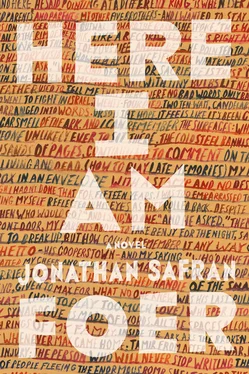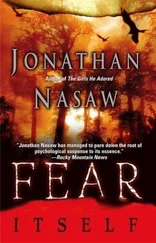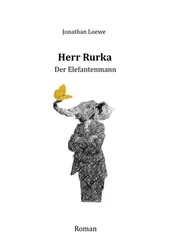For some, it was the inability to forgive Israel’s actions during the war — even a massacre or two would have been easier to accept than the complete and explicit abdication of responsibility for non-Jews — the withdrawal of security forces and emergency personnel, the stockpiling of medical supplies that had urgent use elsewhere, the withholding of utilities, the rationing of food even amid a surplus, the blockade of aid shipments to Gaza and the West Bank. Irv — whose once-daily, occasionally inflammatory blog had become a rushing river of provocation — defended Israel at every step: “If it were a family in a time of emergency, and not a country, no one would judge parents for keeping food in the fridge and Band-Aids in the medicine cabinet. Things happen, especially when your death-loving neighbors hate you to death, and it is not unethical to care more about your own children.”
“If the family lived only in its own house, you might almost be right,” Jacob said. “And you might almost be right if every family were equally able to give preferential treatment to its own. But that’s not the world we live in, and you know it.”
“It’s the world they created.”
“When you look at that girl, Adia, your heart doesn’t go out to her?”
“Of course it does. But like every heart, mine is of limited size, and if it came down to Adia or Benjy, I would pull the food from her hands to put into his. I’m not even arguing that that’s right or good. I’m just saying it isn’t bad, because it isn’t a choice. ‘ Ought implies can ,’ right? To be morally obliged to do something, you have to be able to do it. I love Noam, Yael, and Barak, but I cannot love them as much as I love Sam, Max, and Benjy. It’s impossible. And I love my friends, but I can’t love them as much as I love my family. And believe it or not, I am fully capable of loving Arabs, but not of loving them as much as I love Jews. These are not choices.”
Irv genuinely and forcefully advocated for every Jewish American of fighting age going to Israel. Categorically. With the exception of the one he couldn’t not love more than the others. He was a hypocrite, a father.
“And yet some people can choose otherwise,” Jacob said.
“Like?”
“Well, the first example that comes to mind is the first Jew: Abraham.”
“Senator, I served with Abraham. I knew Abraham. Abraham was a friend of mine. Senator, you’re no Abraham.”
“I’m not saying I could choose otherwise. Obviously I couldn’t.”
Was that obvious? Irv had collapsed the circle of concern to the youngest in his family, but was that the center? What about oneself? Julia had asked Jacob if it made him sad that they loved the kids more than each other. But did Jacob love his children more than he loved himself? He ought to, but could he?
For other American Jews, it wasn’t Israel’s actions that created an emotional distance, but how those actions were perceived — those whose good faith in Israel could always be counted on either switched sides or fell silent, and left American Jews feeling more alone than indignantly righteous.
For others, it was the discomfort of Israel being neither a scrappy underdog nor a bitty superpower capable of bombing its Stone Age neighbors back into the pre — Stone Age. David was good. Goliath was good. But you’d better be one or the other.
The prime minister had set the goal of bringing one million American Jews to Israel with Operation Arms of Moses. Twenty thousand went on the first day of flights — if not in the same ballpark as the hoped-for fifty thousand, at least playing the same sport. But instead of reaching three hundred thousand by the end of the third day, the numbers kept halving, like box office receipts. The Times estimated that fewer than thirty-five thousand American Jews ultimately went, and that three-quarters of those were forty-five or older. Israel survived without them — the army pulled back to its defensible borders and allowed disease to do the work of killing; the tragedy lasted five hundred televised hours. But neither Israelis nor American Jews could deny what was exposed.
Jacob still thought of Tel Aviv as vibrant and cultured, and Jerusalem as irresistibly spiritual. He still felt an almost sexual delight when he recalled the actual places where almost-make-believe things actually happened to almost-make-believe people. The women with guns still gave him an actual sexual delight. The ultra-Orthodox still disgusted him, and he still couldn’t repress the misplaced gratitude he felt for them. But something had changed.
What was Israel to him? What were Israelis? They were his more aggressive, more obnoxious, more crazed, more hairy, more muscular brothers … over there . They were ridiculous, and they were his . They were more brave, more beautiful, more piggish and delusional, less self-conscious, more reckless, more themselves. Over there . That’s where they were those things. And they were his .
After the near-destruction, they were still over there , but they were no longer his .
At each step, Jacob had made efforts to rationalize Israel’s actions — to defend, or at least excuse, them. And at each step, he believed what he said. Was it right to regulate incoming aid shipments if it slowed down their delivery? It was necessary, in order to maintain order and security. Was it right to take the Temple Mount? It was necessary, in order to protect it. Was it right to withhold equal medical care from anyone with equal needs? It was necessary, in order to fully care for Israel’s citizens, who, unlike its Arab neighbors, had nowhere else to turn. “ Ought implies can .” And yet the destination to which those defensible, or at least excusable, steps led was an Israel that sat on urgently needed aid, conquered the most contentious Muslim territory in the world, and forced the mothers of children who didn’t need to die to pound on locked hospital doors. Even if there couldn’t have been another way, there ought to have been.
Would anyone notice, the next morning, if the ocean widened by a foot overnight? If it widened by a mile? By half? The horizon conceals the distance, as does the distance itself. American Jews didn’t think of themselves as having pulled back, and would never have described their relationship to Israel that way — not to others, not to themselves. But even as they claimed relief and joy that Israel had triumphed, even as they marched in parades and sent uncomfortably large checks to the rebuilding effort, the Israeli waves took longer to reach the American shore.
Unexpectedly, the distance between Irv and Jacob closed. For a year, they went to shul together and said Kaddish for Isaac, three times a day every day — or at least once, most days. And on the days they didn’t go, they threw minyan to the wind and mourned in Irv’s living room, facing the bookshelves, whatever their compass direction. They found a new language — not free of jokes, irony, and argument, but no longer dependent on them. Maybe it was a rediscovered language.
No one was less qualified than Irv to help Jacob move — he didn’t know a fitted sheet from a slotted spoon — but no one helped him more. They made trips to IKEA together, to Pottery Barn, and Home Depot, and Gap Kids. They bought two brooms and talked about transitions, and beginnings, and impermanence, while brushing at what felt like infinite dust. Or they brushed in silence.
“It isn’t good to be alone,” Irv said, trying to figure out the vacuum cleaner.
“I’ll try again,” Jacob said. “I’m just not ready yet.”
“I meant me.”
“Did something happen with Mom?”
“No, your mother’s the best of them all. I’m just thinking about the people I’ve pushed away.”
Читать дальше












